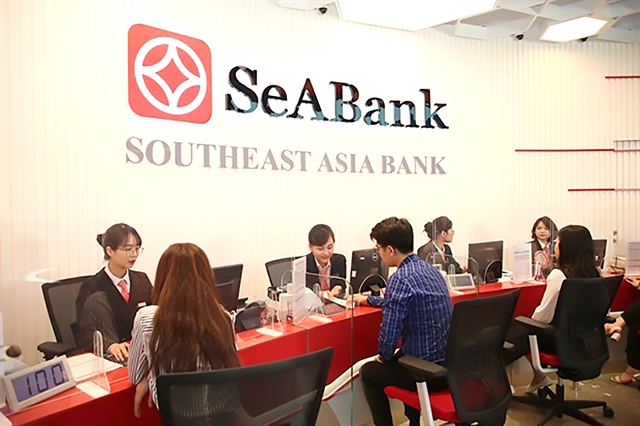A number of Vietnamese banks are grabbing interest of foreign investors who are major banks or financial groups.

The Southeast Asia Commercial Joint Stock Bank (SeABank, coded SSB) has revealed a plan for the private placement of nearly 95 million shares, equivalent to 4.63 per cent of its current shares and over 3.7 per cent when the placement is completed, to a professional stock investor expected to be the Norwegian Investment Fund for Developing Countries (Norfund).
SeABank said the offering price will not be lower than VNĐ12,861 (over US$0.5) per share, which was stated in the audited 2022 separate financial statement, and the highest price is expected at VNĐ37,032 per share. The bank is set to collect a minimum of more than VNĐ1.2 trillion and a maximum of over VNĐ3.5 trillion from this deal.
Saigon - Hanoi Commercial Joint Stock Bank (SHB, coded SHB) is also attracting foreign investors. Reuters recently cited its private source as saying that SHB is preparing to offer 20 per cent of its shares’ value to a strategic partner. The names of the parties concerned have not been disclosed, but some sources said several potential investors from the Republic of Korea and Japan have had meetings with SHB.
The value of this deal is hoped to stand at $2 - 2.3 billion, and the transaction will be completed in 2023 or early 2024 after getting approval from the State Bank of Việt Nam (SBV).
Foreign investors’ ownership of SHB is around 7 per cent at present, much below the ceiling limit of 30 per cent set by the SBV. This is considered a promising opportunity for foreign investors.
Earlier, SHB finished the transfer of 50 per cent of the charter capital of its SHB Finance Co Ltd to Thailand’s Bank of Ayudhya Public Co Ltd (Krungsri), a strategic member of the MUFG group of Japan, after over one year since SHB and Krungsri signed a capital transfer contract. The two sides will continue transferring the remaining 50 per cent after three years, as stated in the contract.
Krungsri once said it would spend 5.1 billion THB ($156 million) on this transaction.
The stocks of SSB and SHB have also been listed in the basket of VN30 Index, which tracks the performance of the 30 largest stocks by market capitalisation and liquidity on the Hồ Chí Minh Stock Exchange (HoSE). Insiders said the presence in the VN30 basket will enhance these stocks’ attractiveness and values even further.
Meanwhile, more than 1.19 billion shares of Việt Nam Prosperity Joint Stock Commercial Bank (VPBank, coded VPB) will be offered through a private placement to Sumitomo Mitsui Banking Corporation (SMBC) of Japan’s Sumitomo Mitsui Financial Group, Inc (SMFG). They equal over 17.73 per cent of VPBank’s current shares and 15 per cent when the placement is completed.
The transaction will be made in the third or fourth quarter of 2023 after the SBV approves and the State Securities Commission confirms its reception of all necessary papers.
With a planned offering price of VNĐ30,159 per share, VPBank hopes to gain more than VNĐ35.9 trillion ($1.5 billion) and raise its charter capital by over VNĐ11.9 trillion. This deal will set a new record in transaction value in the banking sector.
Likewise, leaders of Joint Stock Commercial Bank for Foreign Trade of Việt Nam (Vietcombank), Liên Việt Post Joint Stock Commercial Bank (LPBank), and Nam Á Commercial Joint Stock Bank (Nam Á Bank) said their banks are planning to increase charter capital by selling shares to foreign investors.
Nguyễn Quốc Hùng, Secretary General of the Việt Nam Banks Association, said with rich experience, foreign banks and financial groups will make consideration before pouring money so as to ensure profitability and improve the governance capacity of domestic credit institutions.
Many banks have reached or almost reached the ceiling limits of foreign ownership. However, others still have low foreign ownership rates, such as SeABank, Nam Á Bank, Bắc Á Bank, BVBank, and KienLongBank. This is one of the factors making Vietnamese banks more attractive to foreign investors, he opined. — VNS





